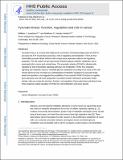Pyruvate kinase: Function, regulation and role in cancer
Author(s)
Israelsen, William James; Vander Heiden, Matthew G.
DownloadPyruvate kinase.pdf (408.3Kb)
PUBLISHER_CC
Publisher with Creative Commons License
Creative Commons Attribution
Terms of use
Metadata
Show full item recordAbstract
Pyruvate kinase is an enzyme that catalyzes the conversion of phosphoenolpyruvate and ADP to pyruvate and ATP in glycolysis and plays a role in regulating cell metabolism. There are four mammalian pyruvate kinase isoforms with unique tissue expression patterns and regulatory properties. The M2 isoform of pyruvate kinase (PKM2) supports anabolic metabolism and is expressed both in cancer and normal tissue. The enzymatic activity of PKM2 is allosterically regulated by both intracellular signaling pathways and metabolites; PKM2 thus integrates signaling and metabolic inputs to modulate glucose metabolism according to the needs of the cell. Recent advances have increased our understanding of metabolic regulation by pyruvate kinase, raised new questions, and suggested the possibility of non-canonical PKM2 functions to regulate gene expression and cell cycle progression via protein–protein interactions and protein kinase activity. Here we review the structure, function, and regulation of pyruvate kinase and discuss how these properties enable regulation of PKM2 for cell proliferation and tumor growth.
Date issued
2015-08Department
Massachusetts Institute of Technology. Department of Biology; Koch Institute for Integrative Cancer Research at MITJournal
Seminars in Cell & Developmental Biology
Publisher
Elsevier
Citation
Israelsen, William J., and Matthew G. Vander Heiden. “Pyruvate Kinase: Function, Regulation and Role in Cancer.” Seminars in Cell & Developmental Biology 43 (2015): 43–51.
Version: Author's final manuscript
ISSN
1084-9521